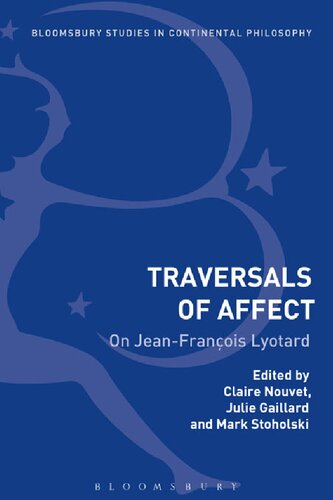Product desciption
Traversals Of Affect On Jeanfranois Lyotard Julie Gaillard Claire Nouvet Mark Stoholski Editors by Julie Gaillard; Claire Nouvet; Mark Stoholski (editors) 9781474257886, 9781474257916, 1474257887, 1474257917 instant download after payment.
The essays collected in this volume trace the topic of affect across Lyotard’s corpus and account for Lyotard’s crucial and original contribution to the thinking of affect. Highlighting the importance of affect in Lyotard’s philosophy, this volume offers a unique contribution to both affect theory and the reception of Lyotard. Affect indeed traverses Lyotard’s philosophical corpus in various ways and under various names: “figure” or “the figural” in Discourse, Figure, “unbound intensities” in his “libidinal” writings, “the feeling of the différend” in The Differend, “affect” and “infantia” in his later writings. Across the span of his work, Lyotard insisted on the intractability of affect, on what he would later call the “differend” between affect and articulation. The singular awakening of sensibility, affect both traverses and escapes articulation, discourse, and representation. Lyotard devoted much of his attention to the analysis of this traversal of affect in and through articulation, its transpositions, translations, and transfers. This volume explores Lyotard’s account of affect as it traverses the different fields encompassed by his writings (philosophy, the visual arts, the performing arts, literature, music, politics, psychoanalysis as well as technology and post-human studies).
Highlighting the importance of affect in Lyotard’s philosophy, this volume offers a unique contribution to both the reflection on affect and the reception of Lyotard. Affect indeed traverses Lyotard’s philosophical corpus in various ways and under various names: “figure” or “the figural” in Discourse, Figure, “unbound intensities” in his “libidinal” writings, “the feeling of the differend” in The Differend, “affect” and “infantia” in his later writings. Across the span of his work, Lyotard insisted on the intractability of affect, on what he would later call the “differend” between affect and articulation. The singular awakening of sensibility, affect both traverses and escapes articulation, discourse, and representation. Lyotard devoted much of his attention to the analysis of this traversal of affect in and through articulation, its transpositions, translations, and transfers. This volume explores Lyotard’s account of affect as it traverses the different fields encompassed by his writings (philosophy, the visual arts, the performing arts, literature, music, politics, psychoanalysis as well as technology and post-human studies). How does affect “traverse” articulation while remaining in a state of radical conflict or “differend” with it? How does this traversal “work” in the visual arts (painting, drawing, cinema), the performing arts, literature, music but also in politics and psychoanalysis? And what does this imply for the very task of “thinking”?


